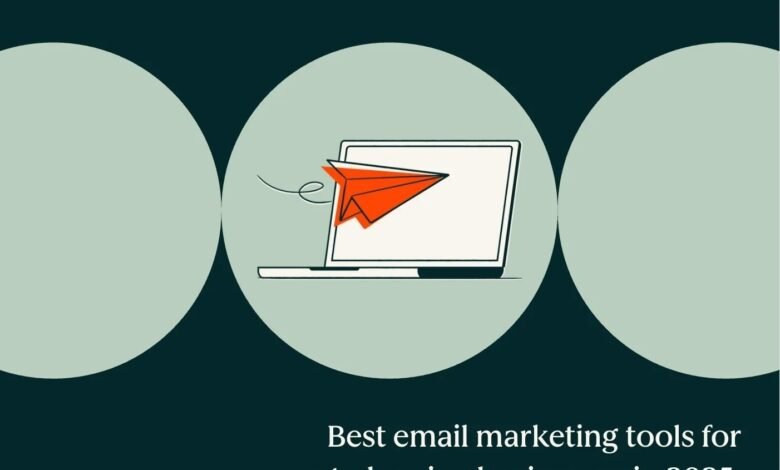Top 10 Email Marketing Tools for Event Planners in 2025

▼ Summary
– Event planning requires specialized CRM systems to manage multiple stakeholders, varied event formats, and personalized communications simultaneously.
– Generic CRMs often lack features for multi-channel attendee journeys, complex registration flows, and sponsor tracking needed in event planning.
– The article provides a detailed comparison of top email marketing/CRM tools for event planning businesses in 2025, including HubSpot and Mailchimp.
– HubSpot is highlighted as a comprehensive solution with event-specific workflows, automation capabilities, and proven ROI for event companies.
– Effective email marketing for event planning involves automating communications, centralizing data, and measuring engagement across the event lifecycle.
Successfully managing events requires more than just coordinating logistics, it demands sophisticated communication strategies that engage attendees, sponsors, and vendors throughout the entire event lifecycle. The right email marketing platform becomes the central nervous system for event planners, enabling them to automate communications, personalize messaging, and track engagement across multiple touchpoints. While generic email tools can handle basic broadcasts, specialized platforms designed for event management provide the advanced functionality needed to navigate complex registration flows, multi-channel attendee journeys, and detailed ROI tracking that turns one-time participants into loyal advocates.
Event planning involves orchestrating numerous moving parts simultaneously. Professionals must coordinate between clients, vendors, sponsors, and attendees while managing shifting timelines across virtual, hybrid, and in-person formats. Standard email marketing solutions often fall short when faced with these multifaceted demands, lacking the integrated features needed for sponsor tracking, complex registration sequences, and automated follow-up campaigns that nurture long-term relationships.
A properly configured email marketing system serves as your operational backbone, centralizing contact data, automating invitation and reminder sequences, segmenting audiences by role and event type, integrating with registration platforms, and monitoring engagement throughout the event lifecycle. This comprehensive approach transforms chaotic communication into streamlined processes that save time while enhancing the attendee experience.
HubSpot Marketing Hub provides event planners with an all-in-one solution that combines robust email marketing with integrated CRM capabilities. The platform’s event-specific workflow templates automate everything from initial invitations to post-event surveys, while smart segmentation ensures each contact receives relevant messaging based on their role and history. With native integrations to popular ticketing platforms and mobile access for on-site management, HubSpot eliminates the need for multiple disconnected tools.
Mailchimp offers an accessible option for smaller event businesses, featuring drag-and-drop email builders and pre-designed event templates. Its visual customer journey mapping helps planners visualize the attendee experience from first touchpoint to post-event feedback, while social media retargeting integration automatically engages subscribers who showed interest but didn’t register.
Constant Contact stands out for planners managing in-person conferences and trade shows with its built-in event registration system that eliminates third-party ticketing fees. The platform’s automated reminder sequences can be scheduled around key milestones, sending save-the-date notices, early bird deadlines, and day-of logistics automatically based on event dates.
Eventbrite excels for ticketed event organizers who prioritize seamless payment processing alongside email marketing. Its native ticketing platform automatically triggers different email sequences based on ticket type, while waitlist management workflows instantly notify interested attendees when spots become available.
ActiveCampaign delivers sophisticated automation for B2B event coordinators managing multi-day conferences. Its predictive content personalization analyzes past event behavior to customize communications, while multi-channel sequences coordinate email with SMS reminders for time-sensitive updates.
Brevo appeals to budget-conscious event startups with its unlimited contact storage and transactional email API that ensures critical messages like ticket confirmations achieve high delivery rates. WhatsApp Business integration provides additional reach for international attendees.
GetResponse specializes in virtual event hosting with integrated webinar capabilities for up to 500 attendees. The platform’s automated webinar funnel templates deploy proven registration-to-attendance sequences that typically increase show rates, while post-event automation segments attendees versus no-shows for targeted follow-up.
Kit serves workshop facilitators and course creators with visual automation builders that create branching paths based on attendance. The platform’s digital product delivery system automatically sends materials, recordings, or certificates upon registration or completion.
Moosend helps seasonal event organizers with weather-based sending optimization that adjusts email timing based on local forecasts. The platform’s countdown timer emails embed dynamic clocks that update in real-time, while recurring event automation templates clone campaigns for monthly or annual events.
Klaviyo supports event planners with e-commerce components through revenue per recipient tracking that monitors exactly how much revenue each campaign generates in ticket sales. Abandoned cart recovery automatically reminds prospects who started but didn’t complete registration.
The benefits of specialized email marketing software extend far beyond basic communication. Automation eliminates time-consuming manual tasks like sending individual confirmations and reminders, freeing planners to focus on strategic elements like sponsor relations and experience design. Data-driven optimization uses engagement analytics to improve attendance rates, while centralized contact databases prevent duplicate communications and ensure VIP recognition across multiple events.
Scalable personalization enables growing companies to maintain boutique-level service even as their attendee base expands, with dynamic content that adjusts messaging based on individual attributes. Comprehensive ROI measurement connects specific campaigns to revenue, sponsor acquisitions, and long-term attendee value, providing concrete data that justifies marketing investments to stakeholders.
When selecting an email marketing platform, event planners should prioritize features that align with their specific workflow requirements. Customizable registration forms with smart field mapping automatically populate CRM records, while multi-channel campaign automation coordinates outreach across email, SMS, and social media. Mobile accessibility ensures real-time attendee management during events, and native integrations with ticketing platforms enable seamless data synchronization. Advanced analytics with attribution reporting reveal which marketing efforts drive ticket sales and conversions.
The selection process should begin with mapping existing event marketing workflows to identify automation opportunities and pain points. Planners should then create a prioritized list of must-have features, considering their team’s technical expertise and operational requirements. Hands-on testing during trial periods reveals ease of use and team compatibility, while cost analysis should factor in scalability and potential savings from tool consolidation.
Flexibility remains crucial, the ideal platform should evolve alongside your event business without requiring disruptive migrations. Modular solutions that allow progressive feature adoption while maintaining consistent workflows and historical data provide the greatest long-term value.
Proven implementations demonstrate the tangible impact of specialized email marketing platforms. Companies managing complex event portfolios have achieved significant time savings, stronger attendance rates, and measurable ROI through integrated systems that streamline communication while providing detailed performance analytics.
The most effective email marketing solutions for event planning combine sophisticated automation with intuitive interfaces, offering both power and accessibility. Whether managing intimate workshops or large-scale conferences, the right platform transforms communication from an administrative burden into a strategic advantage that enhances attendee experiences while driving business growth.
(Source: HubSpot Marketing Blog)





